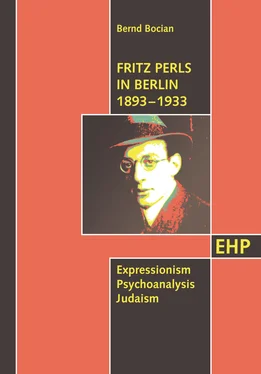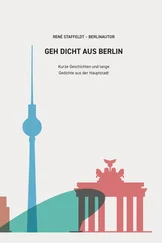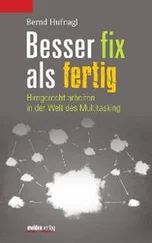Bernd Bocian - Fritz Perls in Berlin 1893 - 1933
Здесь есть возможность читать онлайн «Bernd Bocian - Fritz Perls in Berlin 1893 - 1933» — ознакомительный отрывок электронной книги совершенно бесплатно, а после прочтения отрывка купить полную версию. В некоторых случаях можно слушать аудио, скачать через торрент в формате fb2 и присутствует краткое содержание. Жанр: unrecognised, на английском языке. Описание произведения, (предисловие) а так же отзывы посетителей доступны на портале библиотеки ЛибКат.
- Название:Fritz Perls in Berlin 1893 - 1933
- Автор:
- Жанр:
- Год:неизвестен
- ISBN:нет данных
- Рейтинг книги:3 / 5. Голосов: 1
-
Избранное:Добавить в избранное
- Отзывы:
-
Ваша оценка:
- 60
- 1
- 2
- 3
- 4
- 5
Fritz Perls in Berlin 1893 - 1933: краткое содержание, описание и аннотация
Предлагаем к чтению аннотацию, описание, краткое содержание или предисловие (зависит от того, что написал сам автор книги «Fritz Perls in Berlin 1893 - 1933»). Если вы не нашли необходимую информацию о книге — напишите в комментариях, мы постараемся отыскать её.
Fritz Perls in Berlin 1893 - 1933 — читать онлайн ознакомительный отрывок
Ниже представлен текст книги, разбитый по страницам. Система сохранения места последней прочитанной страницы, позволяет с удобством читать онлайн бесплатно книгу «Fritz Perls in Berlin 1893 - 1933», без необходимости каждый раз заново искать на чём Вы остановились. Поставьте закладку, и сможете в любой момент перейти на страницу, на которой закончили чтение.
Интервал:
Закладка:
In this milieu, philosophy and epistemology were often not studied in the actual sense but rather assimilated through »osmosis« to a large extent and »existentially anticipated« (ibid, 151). The philosophical foundation of the Expressionist groups (and indeed of all oppositional circles from left to right) was Lebensphilosophie, which was synonymous, particularly in its Nietzschean form, with an anti-bourgeois position and criticism of the Wilhelminian value system. This philosophical foundation will require our attention, as will the most succinct expression of the avant-garde movement with its anti-bourgeois self-image, to the extent it transpired within the field of lived art or philosophical action. Here, I am referring to Dadaism in Berlin, with which Perls was affiliated through Salomo Friedlaender/Mynona, his first »guru« (see Erlhof in Hausmann, 228; Exner 1996, 264 f.). Perls, who was truly a follower of Diogenes, a neo-kynic, in terms of Sloterdijk (1983b, 711 f.), was one of the few people to retain the spirit of Dada until the end of his life. For Raoul Hausmann, the most important representative of the Dada group in our context, Dada was »a state of being, more a form of inner mobility than an art movement« (Hausmann 1982b, 229). I will posthumously proclaim Perls the first and only Gestalt-Dada.
3) Furthermore, Perls belonged to the very small faction of »Freudian psychoanalysts with a leftist political orientation« (Jacoby 1990, 65), whom I would like to term the »Berlin character analysts« based on their innovative treatment techniques. 3This was another group whose members were born around the turn of the century and found themselves in the midst of their professional training when National Socialism drove them into exile. Along with these individuals, Freudian psychoanalysis lost its culturally and socially critical element for years, and its center of gravity now shifted from Europe to America. 4In this regard, I would like to recall the anarchistic psychoanalyst Otto Gross. He was a forerunner of the leftist Freudians and was responsible for the influence of psychoanalysis, although in a radical culturally critical form, in the bohemian circles of Munich and Berlin prior to the First World War. We will show how much this almost forgotten man’s thinking continued to have an effect – even on Gestalt therapy. In my opinion, the blueprint for Gestalt therapy that was mutually developed with anarchist writer Paul Goodman at the end of the 1940s, in some respects represented a continuation of attempts begun in Berlin to develop a socially critical, active, emotion-oriented psychoanalysis which also incorporated body language to a greater degree.
The course of Perls’s life in Germany passed through all of the formative stages that were typical for the left-leaning urban intelligentsia that thought of itself as anti-bourgeois: rebellion against the suffocating domestic and social patriarchy of Wilhelminian society; the traumatic experiences of the First World War; the German »November Revolution« and the gory counter-revolution; the years of success for the cultural avant-garde; political radicalization and, finally, emigration. His participation in the small leftist Freudian movement in connection with his professional training must be added to the list.
For Perls and many of the protagonists with this background, all of these influence factors must be complemented by the fact that he was born in Germany as the child of Jewish parents. Due to the subsequent course of German history, this influence factor must also be examined, regardless of the respective identities of the individuals depicted. In this context, I would like to undertake this examination in relative detail, not only because Perls’s German-Jewish background is absolutely key to understanding him and has been generally neglected, but also because I consider it important to remember this world and its significance for Germany and European culture.
2. The Jewish Context and the Educational Ideal of Classical Humanism
An obscure lower middle class Jewish boy. (F. Perls 1977, 1)
Roses are reddish, violets are blueish.
If it wasn’t for Christmas,
we’d all be Jewish. (F. Perls in Kogan 1976)
In the question of whether Perls was a Jew, I follow the argumentation of Leon Botstein. Viewing a person as a Jew and labeling him one, even though he himself did not fundamentally feel like a Jew or define himself as such, is to apply an »extremely racist definition« (Botstein 1991, 15). Botstein argues:
The only legitimate reason for using the maximal definition – which is to say, everyone who had one or two generations of Jewish forebears was a Jew – lies in the fact that it constitutes an objective historical reality which was created through widespread anti-Semitism beginning at the end of the 18 thcentury. Assimilation notwithstanding, the majority of people, either in the German-speaking countries or in Russian and Polish circles, never let it slip their mind if someone had Jewish ancestry. (ibid., 17)
On the first page of his autobiographical outline, Fritz Perls calls himself a »lower middle class Jewish boy« (Perls 1977, 1), and the collection of memories published by Gaines contains reports that even in his final years he continued to come out with Yiddish sayings and rabbi stories (see Gaines 1979, 338 f.). His grandparents were religious, as was his mother and possibly also his oldest sister, Elisabeth, who worked as a secretary for the Jewish community in Berlin. His father appears to have been an emancipated and enlightened assimilated Jew whose sole orientation was the abstract religious humanism of the Free Mason movement. As a boy, Fritz Perls learned Hebrew in preparation for his Bar Mitzvah, a ceremony through which he came of age in a religious sense at thirteen. The preparatory instruction at the synagogue was »impersonal« (Perls 1977, 249) and the ceremonies in the synagogue remained »strange and peculiar« to him (ibid.). Yet by being bar mitzvahed, Perls received more instruction in the Jewish religion than Sigmund Freud, for example, (see Gay 1988, 131) although like the latter he remained an »unbelieving Jew« (Freud in Gay ibid., 133).
Since the Jewish context 5of Perls’s life has not received close attention until now, I would like to begin this monograph by providing basic information on the situation of Jews in the German Empire up until the time that Perls was born.
2.1 Jews in the German Empire. Between Anti-Semitism and German-Jewish Cultural Chauvinism
When the German Empire was founded in 1871, Jews in the entire empire obtained full legal emancipation. In the following years, anti-Semitic propaganda campaigns were launched. The German Empire, created essentially by Bismarck through diplomacy and war, was a latecomer among the major European powers and remained an insecure entity. There was a vision of a strong, cohesive nation. The goal was homogeneity, as it was in the nationalization of other European states, and consequently there was cultural intolerance and an unwillingness to accept or abide diversity. 6Those who differed, the »enemies« of unity, threatened from within and without to thwart the process of creating a community which had only just been set in motion. Numbering among the social groups designated as Reichsfeinde (enemies of the empire) were the social democrats, and democrats altogether, Roman Catholics, the Poles, and the Jews. Anti-Semitism was a solidarization factor during a time when the nation was as yet unconsolidated and this was perceived as a deficiency. It became increasingly dispensable during the subsequent period of economic success and imperialistic growth, only to grow more significant again after the empire lost its position of power at the end of the First World War. This was not a specifically German phenomenon. Anti-Semitism had also gone hand in hand with national chauvinism during the 1890s in France, where it represented an attempt to compensate for the taint of defeat in the war against Prussian Germany (see Battenberg 1990b, 232). The struggle against the putative enemies of German unity increasingly was no longer seen exclusively against a backdrop of a territory that was now under unified rule and dominated by religious Protestants. Rather, the sense of unity progressively derived its »material« basis from the myth of a common origin that was bestowed by nature and could not be acquired (see Bauman 1995, 141 f.). As a German nation proceeded to emerge out of a multitude of minor German states with various religions and cultures, a metaphor became increasingly important, namely, that of identical »pure German blood« pulsing through a body without which each individual organism would not be part of the German volk, would not belong to the German volk-body. Jews were too different, so to speak, and therefore could not be assimilated. They were repeatedly identified as foreign elements within the volk-organism and expelled. Confluent incorporation into the new organism was not possible. I am intentionally drawing on a mixture of historical and Gestalt-therapy terminology here, because I assume that the topic of assimilation, which is so important for the development of Gestalt therapy, and the terms used in this connection arise in part from Perls’s experience as a Jew in Germany.
Читать дальшеИнтервал:
Закладка:
Похожие книги на «Fritz Perls in Berlin 1893 - 1933»
Представляем Вашему вниманию похожие книги на «Fritz Perls in Berlin 1893 - 1933» списком для выбора. Мы отобрали схожую по названию и смыслу литературу в надежде предоставить читателям больше вариантов отыскать новые, интересные, ещё непрочитанные произведения.
Обсуждение, отзывы о книге «Fritz Perls in Berlin 1893 - 1933» и просто собственные мнения читателей. Оставьте ваши комментарии, напишите, что Вы думаете о произведении, его смысле или главных героях. Укажите что конкретно понравилось, а что нет, и почему Вы так считаете.











